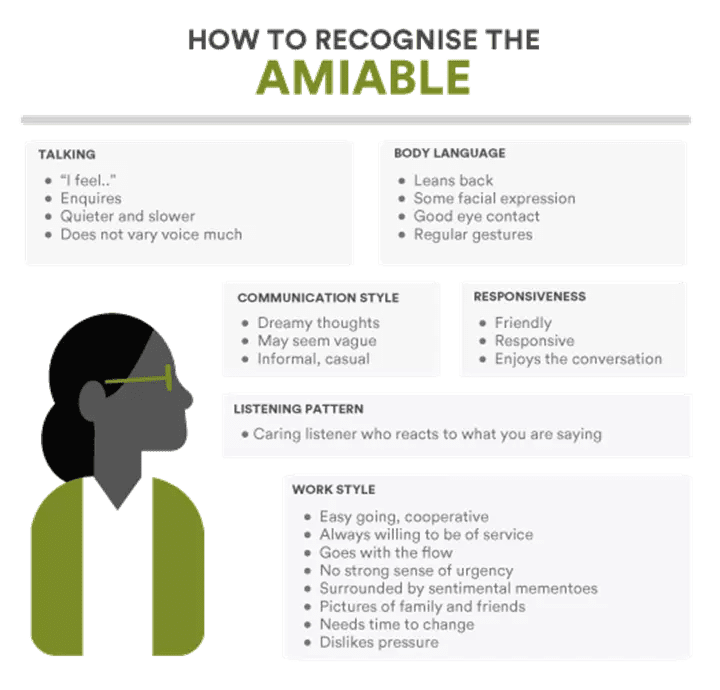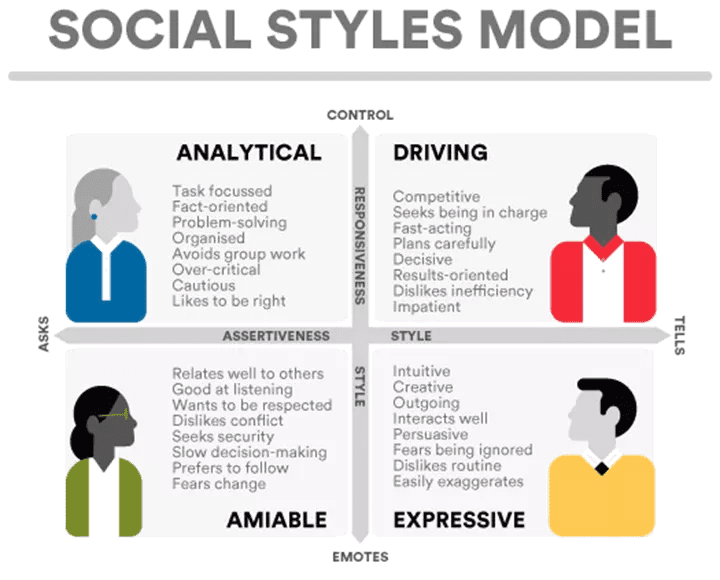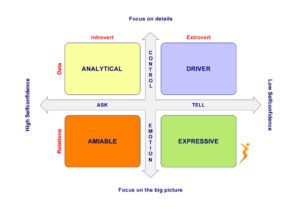
What is the Amiable Personality Type?
The Amiable Social Personality Type is High in Responsiveness and Low in Assertiveness. Amiable type people are people-oriented, well-organized, and patient.
Amiable Personality Type cross-reference
- Keirsey Type – Artisan
- Temperament Type – Sanguine
- Animal Type – Golden Retriever
- DISC Type – Steadiness
- True Colors – Orange
- Color Code – Yellow
- Personality Compass – South
- Occupational Type – Conventional
- Learning Type – Reflector
- Leadership Type – Accommodator
MBTI Personality Types (xSxP) – Sensing and Perceiving
Enneagram Types
- Type 2 – The Helper (ESFP, ISFP)
- Type 6 – The Loyalist (All Sensing)
- Type 7 – The Enthusiast (ESTP, ESFP)
- Type 9 – The Peacemaker (ISFP)
What are the 4 Social Personality Types?
There are four behavioral-focused Social Personality Types based on your level of Assertiveness and Responsiveness. It’s your personality that’s on display!
In the early 1960s, two industrial psychologists, David Merrill and Roger Reid, wanted to understand whether they could predict managerial, leadership, and sales performance. To do this, they explored how people behaved in social situations and chose not to concern themselves with why.
Merrill and Reid started with BF Skinner’s ideas of behaviorism and James Taylor’s structured list of behavioral descriptions, and they discovered that people’s behavior follows along two continua, which they labeled Assertiveness and Responsiveness.
Assertiveness Style
The Assertiveness Style ranges from asking behaviors to telling behaviors, while the Responsiveness Style varies from emoting or displaying our feelings to controlling our emotions.
Assertive people can initiate, maintain, and terminate conversations skillfully. They are competitive, dominant, forceful, and independent.
Responsiveness Style
Responsive people are others-oriented, meaning they listen to others and show a general concern for their success. They are helpful, compassionate, friendly, sincere, and considerate of others’ feelings.
An individual’s level of Assertiveness and Responsiveness determines their Social Style.

Learn more about the 4 Social Personality Types.
The Amiable Personality Type
Traits
- People-oriented
- Organized
- Patient
Motivation
- Respect and appreciation.
Under-stress:
- May become indecisive and acquiescing.
Amiable Type Communication Styles
- Please make an effort to be cooperative and support their feelings.
- Be systematic, thorough, deliberate, and precise.
- Try to stay focused on the tasks.
- Provide analysis and facts supported by evidence.
- Be prepared to answer “How” type questions.
When the Amiable communicates with an Analytical
Relate to your cooperative, careful, quiet, thoughtful, and willing ways.
Question your soft-hearted, easygoing nature, emotional responses, and compliance with
others.
- Stress the need for facts and data rather than emotions to build a case, but let them do the
- work-up with a time limit.
- Provide added opportunities for classwork and study in return for meeting activity
- standards.
- Build confidence in the relationship through demonstrated technical competence.
When the Amiable communicates with an Expressive
Relate to your supportive, friendly, responsive, and helpful characteristics.
Question your slowness to act and your careful, complying, non-competitive stance.
- Try to bring them definite opinions backed by third-party endorsement; do not waver.
- Publicly recognize and praise their accomplishments.
- Stand your ground when challenged about rules and previously established procedures.
When the Amiable communicates with a Driver
Relate to your supportive, helpful, team-oriented, and caring nature.
Question your lack of initiative, need for detail, small thinking, and Responsiveness.
Working with this Style will require you to exercise your versatility.
- Be businesslike; let them tell you how to help and what they want. Do not try to build a
- relationship or friendship.
- Stay on schedule; stick to the agenda; provide factual summaries.
- Let them make decisions based on the options you provide.
When the Amiable communicates with another Amiable
Perceive you as supportive, quiet, friendly, shy, retiring, team-oriented, helpful, kind, thoughtful, slow to act, non-threatening, soft-hearted, easygoing, complying, responsive, open, willing, careful, and cooperative.
Be hard-nosed, insistent, and directive (an uncomfortable role but a necessary one in this situation); otherwise, no one will likely take the required initiative, and the result will be unsatisfactory.
Amiable Type Action Plan
| Amiable Characteristics | So You |
|---|---|
| They are concerned with stability. | Show how your idea minimizes risk. |
| They think logically. | Show reasoning. |
| They want documentation and facts. | Provide data/proof. |
| They like personal involvement. | Demonstrate your interest in them. |
| They need to know the step-by-step sequence. | Provides outline instructions as you walk them through. |
| They want others to notice their patient perseverance. | Compliment for their steady follow through. |
| They avoid risks/changes. | Give them personal assurances. |
| They dislike conflict. | Act non-aggressively, focus on a common interest or needed support. |
| They like to accommodate others. | Allow them to provide service or support for others. |
| They look for calmness and peace. | Provide a relaxing, friendly atmosphere. |
| They enjoy teamwork. | Please provide them with a cooperative group. |
| They want sincere feedback that they’re appreciated. | Acknowledge their easygoing manner and helpful efforts when appropriate. |
Portrait of an Amiable’s Office
You will first notice pictures of loved ones on the desk: husband, wife, family, and favorite pets. They’ll be in a candid style, and the Amiable loves to talk about them.
Colorful photos of landscapes, waterfalls, birds, and sunsets will be on the walls.
You’ll find flowers or plants that are growing well and office colors that are harmonious and restful.
They will almost certainly dress in colors that match.
The furniture will be fashionable but not overwhelming.
Files are present but usually kept out of the way.
If you’re a little late, the Amiable won’t mind.
The Amiable likes company newsletters, picnics, gatherings, and retirement parties.

